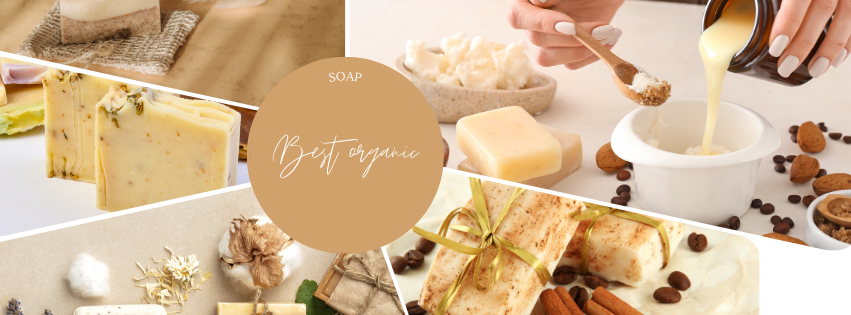Best Organic Soap: A Guide to Healthier Skin

The Rise of Organic Products
Looking for the best organic soap?In today’s world, where natural and organic products are gaining popularity, people are becoming more conscious of what they put on their skin. The demand for organic skincare products, including soaps, has surged as consumers seek healthier and more sustainable options. This shift towards organic products is driven by a growing awareness of the harmful effects of synthetic chemicals found in conventional skincare items. People are now prioritizing their health and the environment, and organic soaps fit perfectly into this new paradigm.
Why Organic Soap Makes a Difference
Organic soaps are crafted using natural ingredients free from harmful chemicals, making them a safer and more eco-friendly choice. Unlike traditional soaps that often contain artificial fragrances, dyes, and preservatives, organic soaps use plant-based oils, essential oils, and herbal extracts. These natural components are not only gentle on the skin but also offer various therapeutic benefits, such as moisturizing, soothing irritation, and providing a natural fragrance.
Health Benefits of Organic Soap
Switching to organic soap can make a significant difference in your overall health and wellness. Here are some key benefits:
1. Free from Toxic Chemicals: Many conventional soaps contain parabens, sulfates, and other synthetic additives that can disrupt hormonal balance and cause skin irritations. Organic soaps are free from these harmful substances, reducing the risk of adverse health effects.
2. Gentle and Nourishing: Organic soaps maintain the skin’s natural moisture balance. Ingredients like shea butter, coconut oil, and olive oil are known for their hydrating and nourishing properties, making organic soaps ideal for dry or sensitive skin.
3. Rich in Antioxidants: Many organic soaps are enriched with antioxidants from natural sources like green tea, chamomile, and aloe vera. Antioxidants help combat free radicals, which can cause premature aging and skin damage.
4. Suitable for All Skin Types: Whether you have oily, dry, sensitive, or combination skin, there’s an organic soap formulated to meet your specific needs. The absence of harsh chemicals means these soaps are less likely to cause allergic reactions or exacerbate skin conditions.
Environmental Impact of Organic Soap
Choosing organic soap is not just beneficial for your skin; it’s also better for the planet. The production of organic soaps typically has a lower environmental impact due to sustainable farming practices. Organic farming avoids the use of synthetic pesticides and fertilizers, which can harm soil health and water quality. Additionally, many organic soap manufacturers use eco-friendly packaging, such as recyclable or biodegradable materials, reducing waste and pollution.
Supporting Ethical Practices
Many organic soap brands are committed to ethical practices, including fair trade and cruelty-free policies. By choosing organic soap, you support companies that prioritize the well-being of their workers and do not test on animals. This aligns with a growing consumer demand for products that are ethically produced and socially responsible.
Why Choose Organic Soap?
1. Healthier Ingredients: Organic soaps are made from natural ingredients like plant-based oils, essential oils, and herbal extracts. These ingredients are often grown without pesticides, synthetic fertilizers, or genetically modified organisms (GMOs), ensuring that you get a product that is not only good for your skin but also for the environment.
2. Gentle on the Skin: Conventional soaps can contain harsh chemicals that strip your skin of its natural oils, leading to dryness and irritation. Organic soaps, on the other hand, maintain your skin’s natural moisture balance and are less likely to cause allergic reactions or skin issues.
3. Environmental Impact: The production of organic soaps typically has a lower environmental impact. Organic farming practices help preserve soil health and reduce pollution. Additionally, organic soap packaging is often recyclable or biodegradable, further reducing your carbon footprint.
Top Organic Soaps on the Market
1. Dr. Bronner’s Pure-Castile Liquid Soap Dr. Bronner’s is a well-known brand in the organic soap industry. Their Pure-Castile Liquid Soap is versatile and can be used for various purposes, including body wash, shampoo, and even household cleaning. Made with certified fair trade and organic ingredients, this soap is gentle on the skin and comes in various scents, such as lavender, peppermint, and tea tree.
2. Aspen Kay Naturals Organic Soap Bar Aspen Kay Naturals offers a range of organic soap bars made with natural ingredients like organic shea butter, coconut oil, and essential oils. Their soap bars are free from synthetic fragrances, dyes, and preservatives, making them ideal for sensitive skin. Popular varieties include Dead Sea Mud & Charcoal, and Turmeric & Neem.
3. Tom’s of Maine Natural Beauty Bar Soap Tom’s of Maine is committed to producing high-quality, natural personal care products. Their Natural Beauty Bar Soap is made with organic botanicals and moisturizing ingredients like virgin coconut oil and raw shea butter. It’s available in different scents, including lavender and lemongrass, providing a refreshing and soothing bathing experience.
4. Kiss My Face Olive Oil Bar Soap Kiss My Face offers a classic olive oil bar soap that has been a favorite for years. Made with pure, natural olive oil, this soap is highly moisturizing and perfect for dry or sensitive skin. It’s free from artificial colors, fragrances, and parabens, ensuring a gentle cleanse without any harsh chemicals.
How to Choose the Best Organic Soap for You
1. Identify Your Skin Type: Understanding your skin type is crucial when choosing any skincare product. Whether you have dry, oily, sensitive, or combination skin, there’s an organic soap that caters to your needs. For instance, if you have dry skin, look for soaps with moisturizing ingredients like shea butter or coconut oil.
2. Check the Ingredients: Always read the ingredient list. Look for organic certification and ensure that the soap does not contain synthetic additives, preservatives, or fragrances. Natural essential oils not only provide a pleasant scent but also offer therapeutic benefits.
3. Consider Your Preferences: Organic soaps come in various forms, including bars and liquids. Decide which format you prefer based on your usage habits. Bar soaps are excellent for body use, while liquid soaps can be more versatile.
4. Read Reviews: Customer reviews can provide valuable insights into the effectiveness and quality of a product. Look for reviews from people with similar skin types or concerns to get a better idea of how the soap might work for you.
Conclusion
Switching to the best organic soap can significantly improve your skincare routine by providing gentle, effective cleansing without the harmful chemicals found in conventional soaps. Whether you choose a versatile product like Dr. Bronner’s Pure-Castile Liquid Soap or a moisturizing bar like Kiss My Face Olive Oil Soap, you’re taking a step towards healthier skin and a healthier planet. Make an informed choice by considering your skin type, checking ingredients, and reading reviews to find the perfect organic soap for your needs.
